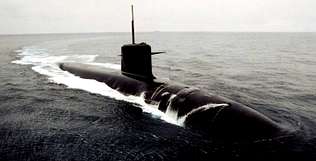The crash of atomic submarines raises questions about the public's right to know

You’d think that the world’s second biggest ocean should be big enough to prevent a crash of submarines, armed with enough atomic explosives to destroy Hiroshima and Nagasaki many times over. But that happened deep down under during the first week in February, when France’s "Le Triomphant" and England’s "HMS Vanguard" bumped into each other.
Fortunately, according to official reports, there were no injuries and the intercontinental missiles and nuclear charges carried by each submarine, equal to several thousand times the explosive power of the Hiroshima bomba (Página 12, 22-2-09) were not affected. French and English authorities dramatically downplayed the incident, saying it was just a small accident during routine patrol missions. But...wait a minute! What’s this about rountine patrols? What does the public really know about the activities of the some 400 nuclear submarines of the U.S., France, England Russia and China which, according to the "La Voz de Galicia (17-2-09), are snooping around the world’s oceans, carrying undisclosed atomic power?
What are all those submarines doing? What is their true mission? Why is the press so obsessively concerned about the eventuality of Iran producing an atomic bomb when the big powers have them? Obviously, politics. Why are the "allies" of the super powers, say, Israel and Pakistan, allowed to have atomic weapons without questioning? Why is it that if you are a super power you can have atomic weapons whereas if you are not a member of the exclusive club you are considered an outcast if you even attempt to investigate the use of atomic energy?
Some 20 countries were affected by the accident at the Russian nuclear plant at Chernobyl, in 1986. And there have been accidents at other atomic plants, at Three Mile Island in the U.S., for example, in 1979...Does the public know what happened to the enormous stock of atomic bombs, neutron bombs and weapons of chemical and bacterialogical warfare developed in the U.S. and the ex-Soviet Union during the Cold War? Inspite of the publicized attempts of the big powers to curb or outlaw the use of atomic weaponery, does the public really know if these weapons of mass destruction are still being investigated and developed?
One of the excuses for the invasion of Iraq presented by the administration of George Bush was the charge that the country had weapons of mass destruction. No weapons of that sort were ever disclosed, at least officially. But the accusation justifying the "preventive war" against that country also raises the question concerning the probable continued existence of weapons of this sort in the hands of the Nuclear Club. If nuclear submarines, armed with powerful atomic weapons can crash in the midst of an ocean as vast as the Atlantic, does that not represent a potential danger for the world? And does not world opinion deserve to be better informed on missions of this sort? Not only could an explosion cause death and destruction of human lives, it would also produce a difficult to measure damage of the ocean’s ecological life.
0 comentarios